|
|
|
Sort Order |
|
|
|
Items / Page
|
|
|
|
|
|
|
| Srl | Item |
| 1 |
ID:
162700
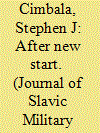

|
|
|
|
|
| Summary/Abstract |
The United States has planned an ambitious strategic nuclear modernization program, as has Russia. Within this context, what are the expectations for New START and its extension to 2026 or beyond? This study analyzes possible scenarios for US strategic nuclear modernization within New START limitations, acknowledging that wild cards include the fate of the INF treaty, threats posed by missile defenses and postmodern counter-defense weapons, and other uncertainties.
|
|
|
|
|
|
|
|
|
|
|
|
|
|
|
|
| 2 |
ID:
082371
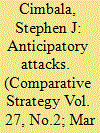

|
|
|
|
|
| Publication |
2008.
|
| Summary/Abstract |
includes both preemptive and preventive attacks. Anticipatory attacks cannot be excluded as options for policymakers and military planners. On the other hand, preemption and preventive options must be used with care. Even when they are employed with favorable military results, anticipatory attacks can have undesirable political side effects. Nuclear anticipatory attacks raise issues in addition to conventional ones. Deterrence based on preemptive threat of nuclear attack is less fault-tolerant than deterrence based on the threat of conventional preemption
|
|
|
|
|
|
|
|
|
|
|
|
|
|
|
|
| 3 |
ID:
132005
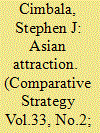

|
|
|
|
|
| Publication |
2014.
|
| Summary/Abstract |
The United States' military-strategic pivot toward Asia is motived by concerns about a rising China, about the increased significance of Asia on the world economic and political stages, and about the growing risks of nuclear proliferation and nuclear first use in that region. Nuclear Asia already numbers five acknowledged or de facto nuclear weapons states among its members: Russia, China, North Korea, India, and Pakistan. Failure to reverse North Korea's nuclear weapons status or political distrust among other powers may increase the number of Asian nuclear weapons states (including states with prospective nuclear-missile reach into Asia) to eight, creating an Asian-Middle Eastern nuclear arms race that defies containment. On the other hand, an alternative presents itself, in the form of a multilateral nuclear arms reduction agreement that would create three tiers of accepted nuclear weapons states and bar the door to new admits.
|
|
|
|
|
|
|
|
|
|
|
|
|
|
|
|
| 4 |
ID:
081274
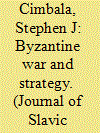

|
|
|
|
|
| Publication |
2008.
|
| Summary/Abstract |
The experience of Byzantium at war is not merely an intellectual exercise for historians but a vital source of insights pertinent to today and tomorrow's wars. The first part of this article offers a brief overview of the topic and the second part draws pertinent "lessons learned" applicable for modern strategy and policymaking. The argument will emphasize the Byzantine experience in the eleventh century-a period of great variation in Byzantine tactical, strategic, and grand strategic (i.e., political) performance. However, relevant evidence is not limited to that time period.
|
|
|
|
|
|
|
|
|
|
|
|
|
|
|
|
| 5 |
ID:
182019
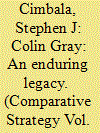

|
|
|
| 6 |
ID:
030418
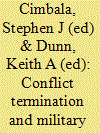

|
|
|
|
|
| Publication |
Boulder, Westview Press, 1987.
|
| Description |
xii, 196p.
|
| Series |
Studies in International Security Affairs and Military Strategy
|
| Standard Number |
0813372283
|
|
|
|
|
|
|
|
|
|
|
|
Copies: C:1/I:0,R:0,Q:0
Circulation
| Accession# | Call# | Current Location | Status | Policy | Location |
| 028134 | 355.02/CIM 028134 | Main | On Shelf | General | |
|
|
|
|
| 7 |
ID:
059198
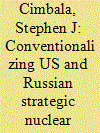

|
|
|
|
|
| Publication |
Oct-Dec 2004.
|
|
|
|
|
|
|
|
|
|
|
|
|
|
|
|
| 8 |
ID:
133995
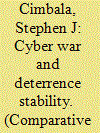

|
|
|
|
|
| Publication |
2014.
|
| Summary/Abstract |
Nuclear deterrence and cyber war are often discussed as separate worlds of research and military-strategic practice. To the contrary, a certain degree of overlap between nuclear deterrence and cyber conflicts is a plausible expectation for several reasons. First, future deterrent challenges will include regional nuclear arms races accompanied by competition in information technology and other aspects of advanced conventional command-control and precision strike systems. Second, cyber-attacks may be used against opposed nuclear command-control systems and weapons platforms as well as against infrastructure for the purpose of mass disruption during a crisis or war. Third, cyber capabilities support escalation dominance or escalation control, depending on the objectives of states and on the transparency of identification for cyber friends and foes.
|
|
|
|
|
|
|
|
|
|
|
|
|
|
|
|
| 9 |
ID:
047394
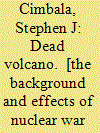

|
|
|
|
|
| Publication |
Westport, Praeger Publishers, 2002.
|
| Description |
xx, 271p.
|
| Standard Number |
0275973875
|
|
|
|
|
|
|
|
|
|
|
|
Copies: C:1/I:0,R:0,Q:0
Circulation
| Accession# | Call# | Current Location | Status | Policy | Location |
| 047088 | 327.1747/CIM 047088 | Main | On Shelf | General | |
|
|
|
|
| 10 |
ID:
158500


|
|
|
|
|
| Summary/Abstract |
Missile defenses have been bones of contention in past arms control negotiations as between the United States and Russia. The likelihood is that ballistic missile defenses (BMD) for protection of the U.S. homeland or for the defense of regional allies in Europe and elsewhere will be of greater interest in view of their maturing technologies and emerging regional threats. On the other hand, the deployment of next generation missile defenses is not an isolated issue. From the standpoint of nuclear deterrence, missile defenses are embedded within a larger framework of emerging technologies, including those for conventional prompt global strike, for cyber warfare, and for the modernization of offensive strategic nuclear forces.
|
|
|
|
|
|
|
|
|
|
|
|
|
|
|
|
| 11 |
ID:
053391
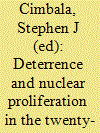

|
|
|
|
|
| Publication |
London, Praeger, 2001.
|
| Description |
185p.
|
| Standard Number |
0275966984
|
|
|
|
|
|
|
|
|
|
|
|
Copies: C:1/I:0,R:0,Q:0
Circulation
| Accession# | Call# | Current Location | Status | Policy | Location |
| 045131 | 355.825119/CIM 045131 | Main | On Shelf | General | |
|
|
|
|
| 12 |
ID:
070796
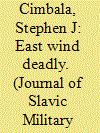

|
|
|
|
|
| Publication |
2005.
|
| Summary/Abstract |
The spread of nuclear weapons in Asia during the first two decades of the twenty-first century has the potential to disrupt existing security arrangements within and outside of the region, to provide a catalytic agent for an outbreak of conventional or nuclear warfare, and to consign to the ash heap of history optimistic projections about the triumph of economic globalism and political postmodernism in the twenty-first century.
|
|
|
|
|
|
|
|
|
|
|
|
|
|
|
|
| 13 |
ID:
028347
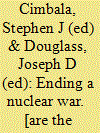

|
|
|
|
|
| Publication |
Washington, Pergamon-Brasseys, 1988.
|
| Description |
x,198p.
|
| Standard Number |
0080359590
|
|
|
|
|
|
|
|
|
|
|
|
Copies: C:1/I:0,R:0,Q:0
Circulation
| Accession# | Call# | Current Location | Status | Policy | Location |
| 030382 | 355.0217/CIM 030382 | Main | On Shelf | General | |
|
|
|
|
| 14 |
ID:
103202
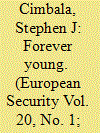

|
|
|
|
|
| Publication |
2011.
|
| Summary/Abstract |
The New Strategic arms reduction treaty nuclear arms control agreement signed by US President, Barack Obama, and Russian President, Dmitry Medvedev, in 2010 is likely to achieve ratification in both Washington and Moscow, but it is too early to break out the champagne or vodka. Even successful ratification of this agreement is, at best, an important but incremental part of the US-Russian policy 'reset' and the larger agenda for both states with respect to arms reduction and nonproliferation. Further reductions in both states' inventories of strategic nuclear weapons are a necessary preface toward credible leadership in stopping the spread of nuclear arms - especially in the looming test cases of Iran and North Korea. In addition, both states have to decipher a policy-strategy nexus for emerging missile defense technologies: in particular, whether missile defenses should be seen as possible means of cooperative security, as between NATO and Russia, or whether they are firewalls in the way of further progress in offensive nuclear arms reductions.
|
|
|
|
|
|
|
|
|
|
|
|
|
|
|
|
| 15 |
ID:
087672
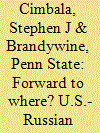

|
|
|
|
|
| Publication |
2009.
|
| Summary/Abstract |
The year 2009 begins a new security relationship, for better or worse, between Russia and the United States. On the policy menu for both states are carry-forward negotiations and looming deadlines with respect to strategic nuclear arms control. Despite the ups and downs of political relations during the years of the George W. Bush and Vladimir Putin presidencies, the United States and Russia have remained committed to reducing their numbers of operationally deployed, long range nuclear weapons. Those commitments have implications for other issues, including nonproliferation and counterterrorism.
Since politics dominates strategy, the outcome of further negotiations on Russian-American nuclear arms reductions depends upon the character of the political winds that blow between Washington and Moscow. During the latter part of the Bush and Putin presidencies, those winds were Arctic. More favorable westerlies and easterlies permit progress, but what realistic options present themselves for policy makers' consideration? The following discussion considers those options, evaluates their credibility, and considers their possible side effects
|
|
|
|
|
|
|
|
|
|
|
|
|
|
|
|
| 16 |
ID:
188357
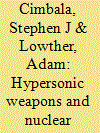

|
|
|
|
|
| Summary/Abstract |
This study explores the relationships between hypersonic weapons and nuclear deterrence. This relationship is fraught with uncertainty because the velocity of innovation in hypersonics is difficult to forecast. Nevertheless, major nuclear powers are developing hypersonic weapons, including some that can be deployed on intercontinental launchers. Hypersonic glide vehicles or cruise missiles could threaten first strike stability by reducing the time for responsive decision making in the face of perceived threats, or by evading antimissile defenses otherwise competent to deflect attacks. Attacks on space based assets and cyberattacks, combined with hypersonic missiles, could pose unacceptable risks to assured retaliation based on an assumed number of survivable launch platforms. On the other hand, analysis suggests that, in the case of the United States and Russia, going forward, strategic nuclear deterrents with currently projected modernization plans should suffice to maintain deterrence and first strike stability, barring unforeseen developments in breakthrough technologies.
|
|
|
|
|
|
|
|
|
|
|
|
|
|
|
|
| 17 |
ID:
193546
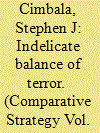

|
|
|
|
|
| Summary/Abstract |
Albert Wohlstetter’s seminal essay of the early Cold War years, “The Delicate Balance of Terror,” calls for revisiting in the current climate of geopolitics and military technology. The possible emergence of China as a near peer competitor with the United States and Russia in strategic nuclear forces changes the dynamics of nuclear deterrence, arms control and strategic stability in Asia and globally. In addition, future deterrence stability will also be challenged by changes in technology, including hypersonic weapons, improved missile defense capabilities, competition in the cyber and space domains, and the uncertain impacts of game changers such as artificial intelligence and nanotechnology. As well, containment of nuclear weapons spread cannot be guaranteed, given the dissatisfaction of some existing and aspiring nuclear weapons states with the present international order.
|
|
|
|
|
|
|
|
|
|
|
|
|
|
|
|
| 18 |
ID:
121925
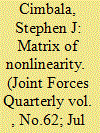

|
|
|
| 19 |
ID:
068342
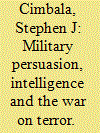

|
|
|
| 20 |
ID:
107579
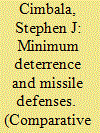

|
|
|
|
|
| Publication |
2011.
|
| Summary/Abstract |
Ratification and entry into force of the New START agreement open the door for possible additional reductions in both states' numbers of deployed long-range nuclear weapons and launchers, but the matrix of post-New START agreement involves nonlinearities with respect to the relationship between minimum deterrence and missile defenses. NATO's Lisbon summit in 2010 invited Russia to participate in a European missile defense system, but Russia is wary of any theaterwide antimissile system that could grow into a more ambitious deterrent-denial force pointed at Russia. Minimum deterrence would drop the numbers of U.S. and Russian strategic nuclear weapons to 1,000 or fewer, but getting Moscow and Washington to move well below 1,000 would require parallel reductions and/or restraints on the part of other nuclear weapons states and a missile defense regime of "cooperative security" rather than mutual suspicion.
|
|
|
|
|
|
|
|
|
|
|
|
|
|
|
|
|
|
|
|
|